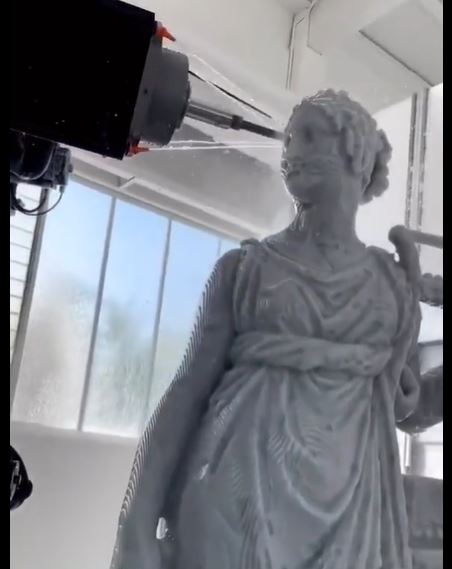With youth unemployment above 60 percent, South Africa is betting on digital skills to drive inclusive growth. Here is how MICT SETA is positioning the next generation for the Fourth Industrial Revolution.
WATCH: AI robots creating sculptures or humans programming better?

Thirteen feet of zinc alloy can do the work of an army of artists.
That’s today’s reality when factoring in the idea that machines or in this case robots can do the work of thousands of men at a fraction of the time.
https://twitter.com/Culture_Crit/status/1689394502094749699?s=20
Is it robots replacing humans or humans programming the robots to do a task?
There are a number of added benefits to having machines create sculptures with a high level of precision and consistency aside from just precision and consistency as the added benefit.
Efficiency, speed, and the innovation to perform massive amounts of repetitive tasks without ever experiencing fatigue or physical limitations is the new norm as a dozen creators have migrated to adding AI including machine production to deliver precise objectives at half the time.
The dawn of AI (artificial intelligence) means old sculpture relics can be preserved and even replicated in half the time.
Yes, there is a lack of emotion or personal touch from the robot onto the canvas, and the introduction of machine creativity means a signaled end to unique qualities that make traditional sculptors captivating, but what are artists really losing, especially in the sculpting industry?
Unemployment is first on the list of cons, as machines, and robots are fast on the uptake for most industries, threatening over-standardization.
Creative limitations are also a sad reality as AI algorithms can now generate designs on popular trends with the ability to draw inspiration at the drop of a hat.
The way forward is simple, evolution in art, including sculpture is necessary to find some balance between tech advancements and preservation of human artistic expression.
Conclusion
While Ai and robots are undeniable benefits of precision, the lack of intuitive depth is not a factor that could derail any business from commissioning a well-penciled AI sculpture.
Yes, the human touch contributes to the artwork’s soul and the overall essence of human creativity. Evolving forward would mean factoring in that the jobs and employment part of this exercise is upskilling in a manner that could leave you as the programmer for AI bots that will do massive amounts of work.
By evolving art forms, including sculpture, we can explore new possibilities and push boundaries while respecting the tradition, history, and craftsmanship that define our artistic heritage.
Also read: Google introduces AI grammar check feature in search

